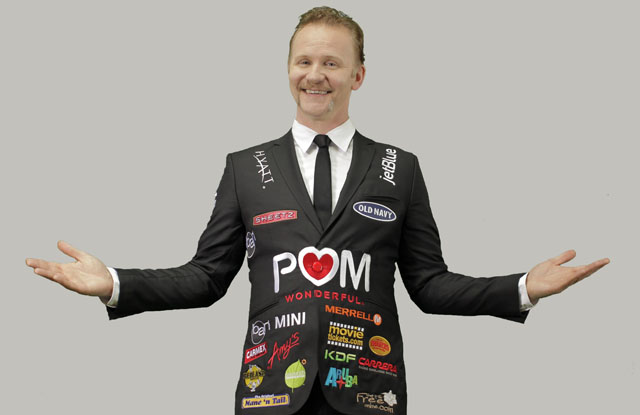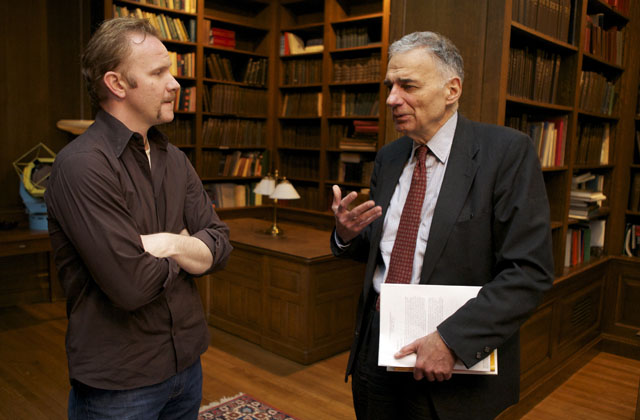CHICAGO – Patrick McDonald of HollywoodChicago.com appears on “The Morning Mess” with Dan Baker on WBGR-FM (Monroe, Wisconsin) on March 21st, 2024, reviewing the new streaming series “Manhunt” – based on the bestseller by James L. Swanson – currently streaming on Apple TV+.
Interview: Morgan Spurlock Sells ‘The Greatest Movie Ever Sold’
CHICAGO – Morgan Spurlock walked into the interview room with his special suit. The black business suit is festooned with product logos, representing the companies that financed his latest documentary, “The Greatest Movie Ever Sold.”
Spurlock, best known for his breakthrough eating documentary, “Supersize Me,” is cheekily at it again, this time exposing American marketing and advertising by literally making a film about getting a film sponsored. In fact, the full title of the “Doc-Buster” (as Spurlock calls it) is “Pom Wonderful Presents: The Greatest Movie Ever Sold.” Pom Wonderful, a pomegranate drink, paid to have the name above the title.
The film essentially follows Spurlock as he convinces the sponsoring companies to sign on, interspersed with commentary from academic luminaries like Noam Chomsky and Ralph Nader, plus film directors J.J. Abrams, Peter Berg, Brett Ratner and Quentin Tarantino, commenting on product placement in the movies.
 Photo credit: Sony Picture Classics |
Morgan Spurlock came to national prominence in 2004 with Supersize Me, a film in which he attempted to eat McDonald’s restaurant food for every meal, for thirty days straight. As a result of that film, McDonald’s actually altered their menu selections and added healthier choices. He followed that format in his TV show “30 Days,” where he experienced various activities for the time period (prison, wheelchair, living on an Indian reservation). His followup documentary, “Where in the World is Osama Bin Laden,” attempted to bridge the gap in understanding with Americans and Middle East countries. Besides his work on those projects, he was also the director and executive producer of “The Simpsons 20th Anniversary Special: In 3-D! On Ice” in 2010.
This is his second interview with HollywoodChicago.com, and he spoke about the new film at length, as well as his impact regarding the style of his documentaries.
HollywoodChicago: You make your point,several times over in this documentary. What personally do you want reflected back to the audience in regards to the content of this communication?
Morgan Spurlock: First, there is the whole idea as to how prevalent marketing and advertising is in our lives. The veil gets pulled back and you start to see it, and that’s the great thing that happens over the course of this movie. It will change the way you watch movies and TV after you see this film.
There is a great conversation that takes place with Janet Dalphonout, the woman who sells advertising for the school districts in Florida. When I asked her about why people were upset about this, she said ‘school is sacred.’ It’s suppose to be this place where kids come that is free from advertising, free from influence, in order to develop their own ideas and ideology. And what I realized after making this film is that nothing is sacred. There is no place you can go where you can be free of being targeted.
HollywoodChicago: We as human beings want attention, want to feel that what we offer can be validated in this world. Besides the idea that this documentary might be the greatest way to get free stuff ever, what validation do you think our stuff gives us?
Spurlock: We live in a time where our ‘stuff’ defines who we are. Your stuff makes you, and defines you. This is what makes you who you are in today’s society. We judge ourselves based on those things, even before we let society judge us. By what you decide to put on your body, for example, you’re already making a personal judgement. That’s an incredible thing that happens…we set our own standards even before we walk out the door. Most of the time, those standards are self insulting. Most of the time we belittle ourselves, because we can’t have the things we think we’re suppose to have. That’s what we’ve bought into.
One of the statements I love in the film is by Mark Crispin Miller [Professor of Media at NYU], where he says you’re not going to be happy making a specific purchase, this action is not going to make you happy. Because it’s a fleeting moment. You think that ‘this is the thing that’s going to make me perfect! I’m going to be so estactic because I have this…that’s what I’m suppose to have.’ For me, it’s just a hard thing to live up to.
HollywoodChicago: The science of advertising is probably more advanced in its own way than the science of medicine or psychology. What was the most shocking element about the science of advertising that you learned pursuing this film?
Spurlock: Neuro marketing [monitoring brain activity while showing ad images] is shocking. Neuro marketing is one of those things when you first hear about it, you think, that’s doesn’t exist. They don’t really do that. That’s not real. And then you go to the lab, and you see the results and you see the MRI machine and they actually put people in there. They then show commercials, movie trailers and the like, and re-edit them base on the neurological response from people in the machines. It’s the ‘Minority Report’ of advertising, it becomes pre-cognizant advertising, where the institution can predict what you want to buy before you want to buy it.
 Photo credit: Sony Picture Classics |
HollywoodChicago: Ralph Nader is in your film, and in concept and essence you are a bit of a post modern version of him. What did he reflect back to you that recognized in yourself?
Spurlock: I love Ralph Nader. I think Ralph Nader is a hero. So many people want to demonize him because of the 2000 election. In his documentary ‘An Unreasonable Man,’ it shows you that it didn’t matter for Gore that he was in the election, Gore still wouldn’t have prevailed, based on the states he won and lost. And Nader has the tag of the man who lost the election for Gore, that’s what he’ll have to defend for the rest of his life.
What I love about Ralph Nader is that 45 years before, he was fighting for ordinary citizens, fighting for people’s rights, long before anyone else. This guy really cared, and cared at the core. When I put my list together of people I wanted to interview, he was at the top. When he said ‘yes,’ it was amazing. You see a side of Ralph Nader in this film that you haven’t seen before, and I loved that he was willing to go there with me.
HollywoodChicago: You became famous for Supersize Me, an incisive indictment of a particular product. Yet in Greatest Movie, you pursue McDonald’s style eateries, wherein if you ate there for 30 days you’d probably have the same troubles you experienced in the previous film. How did this reconcile with your thesis in the new film?
Spurlock: Well, it’s a different movie. The idea and conceit of this film was to make a documentary blockbuster, we wanted to make a ‘DocBuster.’ In order to make a DocBuster, we wanted to be like ‘Star Wars,’ ‘Transformers’ and the like. They have ‘Happy Meals,’ and tie-ins to the fast food restaurants. To make a DocBuster we have to have a tie-in. Of course, McDonald’s wouldn’t call me back, big surprise. [laughs]
HollywoodChicago: McDonald’s had to know you were doing this.
Spurlock: We called them! I literally said to them, this is Morgan Spurlock. [Making phone gesture] Hello…hello. There is probably my face near their phones, with a circle and a line through it. [laughs]
 Photo credit: Kathbur Pictures |
HollywoodChicago: You were the super lucky executive producer for The Simpsons 20th Anniversary Special. As a Simpsons admirer, what minutiae or arcana did you luxuriate as the captain of that ship?
Spurlock: For me, it was traveling the world and meeting Simpson’s fans all over the globe that was so awesome. Like when we went to Argentina and met the guys who are literally brewing Duff Beer. When I got the message that the Simpson’s production team wanted me to direct their special, I was like yeah, right and hung up. My agent called me back and told me the call was for real, call them back.
I flew out to Los Angeles and met with Denise Sirkot [Producer] and Al Jean [Executive Producer], and I sat in the room with the Simpson’s brain trust. I even met James L. Brooks and Matt Groening. The fact that these guys wanted me to do the special, it was a true gift.
HollywoodChicago: Here is what you said in our first interview: “The torch is about to be passed to a new president in less than a year, and whoever that is will really have to examine what our world policy is and what we will try to do to try to reclaim the idea that America is seen as both a beacon of democracy and a beacon of hope. A country that really wants what is best for the world, which right now isn’t what the majority of people feel.”
Given that prescient statement, what is you opinion of how Barack Obama has performed as commander-in-chief next to that quote?
Spurlock: For me, some of things we talked about in ‘Where in the World is Osama Bin Laden?’ if you look at Mubarek and the dictatorial regimes that are falling, there were people who desired the same freedoms we preach everyday. I think we had an incredible opportunity to capitalize on that right up to Libya. I think we’ve made a step toward something that might be a mistake. I personally believe Saddam Hussein and Ghadafi are not good guys by any judgement, and there are ways to deal with it beyond what we did. Once you decide to attack, it paints an ill-conceived picture.
HollywoodChicago: You are a pioneer in the “personal documentary,” wherein the subject of the piece is the creator of the film himself. What is your opinion about the evolution of this form since you came on scene, both personally and in the marketplace?
Spurlock: To be able to tell a personal story is the whole reason I do it. Originally, in ‘Supersize Me,’ I wasn’t going to do it, I was going to have someone else be that guinea pig, and I was going to film it. What I began to realize is that if followed someone else, how do I know they were not going to sneak home and eat some bok choy? [laughs] What I got out of this experience, and my TV show ‘30 Days,’ and the Osama Bin Laden film, is that as a human being I found it to be incredibly fulfilling.
I personally gained so much out of all those experiences – being in jail, living on a Navajo reservation, surviving on minimum wage, going to the Middle East and meeting these people we love to demonize everyday – these things help reshape me as a person. And what I hope comes out of the work I do, is that you go on this vicarious journey with me. When I learn, you learn, what I feel, you feel. There are people out there trying to do the same thing, and personally I hope there is more of it. The more we can be honest about ourselves as filmmakers, than the more we can be honest with people who see the films.
HollywoodChicago: In shaping your own son’s education based on the corporate and geopolitical perspective you’ve gained doing the films, are there any situations when sending the right message is difficult?
Spurlock: My kid loves cartoons, he’s at the age where he wakes me up and says, ‘Daddy, let’s watch cartoons!’ I try not to show them to him on regular television, even though their are days you have to. It’s like, ‘you watch this, I have to get ready.’ At some point it will happen. It’s then I realize why I can’t do that. You come downstairs, turn off the TV, and then he says, ‘Daddy, I want to get that wrestling set, and all the pieces are sold separately.’ The minute he quotes a commercial verbatim, that’s when he’s had enough TV. [laughs] Click!
 | By PATRICK McDONALD |



More on Morgan Spurlock
Here’s another interview he did for Theodora & Callum’s ‘Creative Factory’
http://www.theodoraandcallum.com/blog/cat/creative-factory/post/my-faves…